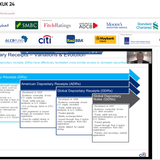Now comes the crisis caused by accusations made by the former Minister of Culture. The list of perilous events continues, with a highlight being the plea bargains emerging from the Lava-Jato probe. That all of this is taking place in a context of economic weakness and with a Congress more focused on questions of lawmakers’ own interests than the urgent economic agenda is all the more worrying.
To judge from recent history, the government under the PMDB does not like to open multiple battle fronts at the same time. However, it may be running out of options. Advancing by steps has its advantages – mainly, pragmatism – but there is a risk the government will lose the long-range perspective. Putting off the economic agenda is fraught with risks, because it contaminates the economic environment and can also make it unmanageable.
Postponing the social security reforms can mean winning approval for a weak proposal, one that will not stabilise the public debt for a good while, or even failure to obtain approval for any measure. The nearer the elections in 2018 become, the less willing Congress will be to discuss controversial matters. Debate over any change in the social security system tends to be slow. The one during Lula’s first term took eighth months. It would thus be important for the government to prepare the terrain for the debates in Congress, by communicating to society the size of the problem and indicating possible ways forward.
The crises in the states, most dramatically in Rio de Janeiro, have increased the federal government’s challenge. This theme should have been discussed with more zeal during the renegotiation of the state governments’ debts in July. A well-directed process, with transparency regarding the needs and causes and the establishment of strict counterpart obligations, might have avoided the current situation. On one side, the governors, in their majority, failed by denying the problem, while on the other, the federal government failed to size up the problem.
Although the decline in tax receipts and revenue from oil royalties is a valid excuse, given its impact on the states’ accounts, it is crucial to recognise two critical points: the states have their share of the blame for the drop in tax revenue; and, the situation is structurally unsustainable, regardless of the fall in revenue.
Declining tax revenue is the fruit of the fiscal crisis, not the contrary, although the two feed off one another. The fiscal irresponsibility of the governments at all levels has destabilised the economic climate, and thus compromised tax receipts. Unacceptable errors were committed. Many states used extraordinary revenues, such as oil royalties and increased debt, to finance current expenditures, especially the public payroll (active and retired civil servants). For that purpose, they used creative accounting to circumvent the payroll spending limits set by the Fiscal Responsibility Law. Institutions, in short, failed. The states therefore need to assume their responsibilities, and support adjustment initiatives of the federal government, and carry out their own adjustments.
Yielding to pressure from the states for bailouts would not be a healthy response by the federal government. And the government appears to know this. Many governors have failed to assume their errors and the need for a structural adjustment, with highlight being reform of the pension system. If the federal government is condescending, the governors will probably be accommodating, sweeping the problem under the rug, creating a false illusion among society and aggravating the problem. What is necessary is serious renegotiation of the state debts.
Hard times demand firm and timely reactions, and the structural economic agenda is an important defense mechanism. The government needs to open the way to renewed focus on the reform agenda. It has been dangerously diverted from this path, aggravating the current economic picture by the contamination on asset prices, hampering return of the economy to normalcy, which can only be achieved with lower inflation and lower interest rates, thus allowing cyclical recovery of economic activity.
The economic fragility is not neutral to the political climate. The political and economic crises are feeding off each other.









